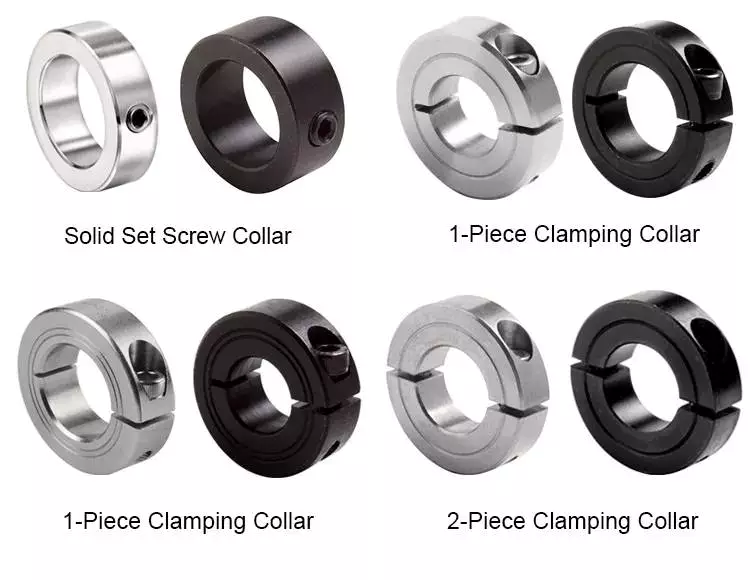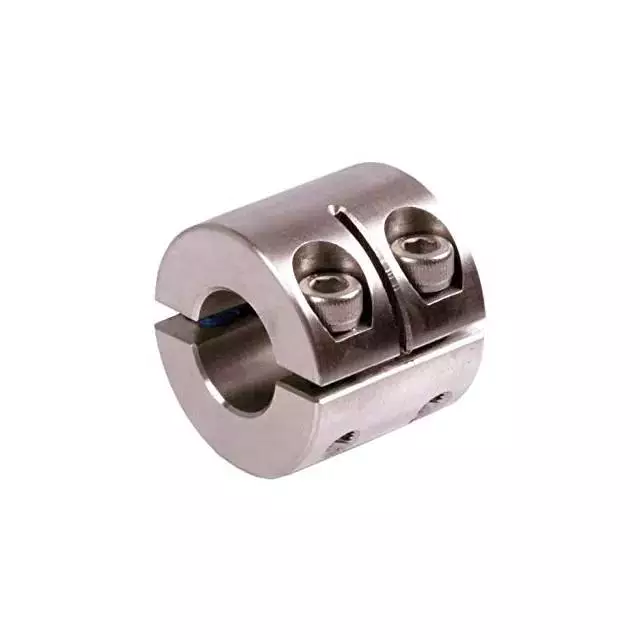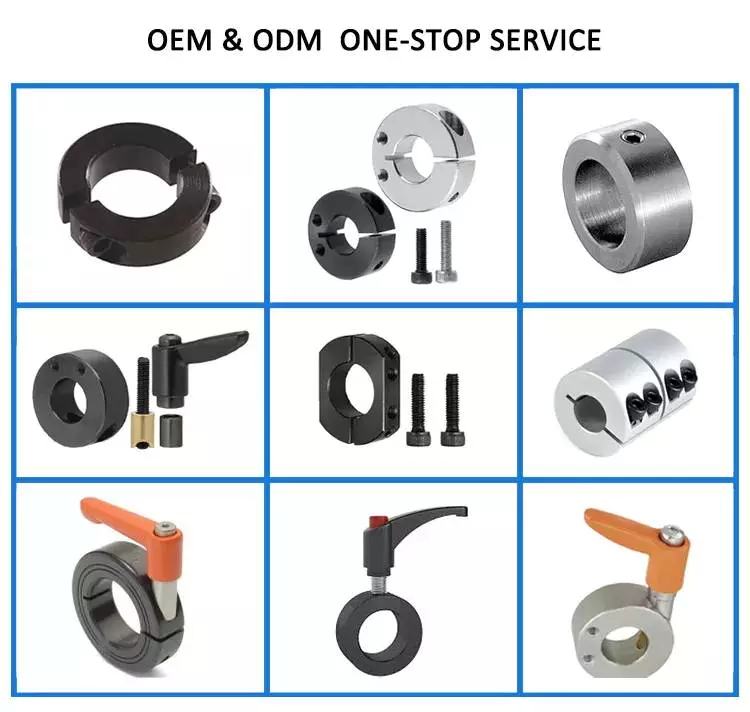
Can I get recommendations for shaft collars suitable for use in harsh environments?
Yes, there are specific types of shaft collars that are designed to withstand harsh environments and provide reliable performance. When selecting shaft collars for use in such conditions, it is important to consider factors such as temperature extremes, exposure to moisture or chemicals, abrasive environments, and high vibration or shock. Here are some recommendations for shaft collars suitable for use in harsh environments:
- Stainless Steel Shaft Collars: Stainless steel shaft collars are highly resistant to corrosion and can withstand harsh environments with exposure to moisture, chemicals, or abrasive substances. They offer excellent durability and are suitable for applications in industries such as marine, food processing, chemical processing, or outdoor equipment where reliability and resistance to rust and corrosion are critical.
- Plated Shaft Collars: Plated shaft collars, such as zinc-plated or nickel-plated collars, provide an added layer of protection against corrosion and wear. These collars are often used in harsh industrial environments where exposure to chemicals, humidity, or outdoor elements is a concern. The plating helps to prevent rust and can extend the lifespan of the collars in challenging conditions.
- Shaft Collars with Seals or Gaskets: Some shaft collars are designed with integrated seals or gaskets to provide additional protection against moisture, dust, and contaminants. These collars create a barrier between the collar and the shaft, preventing the entry of debris or liquids. They are commonly used in applications where water or dust ingress is a potential issue, such as outdoor equipment, agricultural machinery, or industrial machinery in dusty environments.
- High-Temperature Shaft Collars: For harsh environments with high-temperature conditions, it is important to select shaft collars that can withstand the heat without deformation or degradation. High-temperature shaft collars, often made from heat-resistant alloys or ceramics, are designed to handle extreme temperatures. These collars are suitable for applications in industries such as aerospace, automotive, or furnace equipment where exposure to high heat is a concern.
- Specialized Coatings or Materials: In some cases, specialized coatings or materials can be applied to shaft collars to enhance their resistance to specific harsh conditions. For example, coatings such as Teflon or epoxy can provide additional protection against chemicals or abrasion. Additionally, certain materials like titanium or Hastelloy offer superior resistance to corrosion and can be utilized in highly corrosive environments.
When choosing shaft collars for harsh environments, it is recommended to consult with manufacturers or suppliers who have expertise in providing solutions for challenging conditions. They can offer guidance on selecting the most suitable collar materials, designs, and additional features based on your specific application requirements and the severity of the harsh environment.

Where can I find information on the materials used in manufacturing shaft collars?
If you are looking for information on the materials used in manufacturing shaft collars, there are several sources where you can find relevant information. Here are some common resources to consider:
- Manufacturer Websites: Many manufacturers of shaft collars provide detailed information about the materials they use in their product specifications or technical datasheets. Visiting the websites of specific collar manufacturers and exploring their product documentation or resources section can help you find information about the materials used in their collars. This information may include the type of material (such as steel, stainless steel, aluminum, or plastic) and any specific properties or characteristics associated with the material.
- Product Catalogs and Brochures: Manufacturers often publish product catalogs or brochures that provide an overview of their collar offerings. These catalogs may include information about the materials used in manufacturing the collars. You can request catalogs from manufacturers directly or check their websites for downloadable versions. The catalogs may highlight the material properties and advantages of using specific materials for different applications.
- Material Databases: Online material databases or directories can be valuable resources for finding information about specific materials used in manufacturing shaft collars. These databases typically provide comprehensive information about various materials, including their composition, mechanical properties, corrosion resistance, temperature tolerance, and other relevant characteristics. Examples of such databases include MatWeb, Engineering Toolbox, or specialized materials databases maintained by industry organizations or universities.
- Technical Standards and Specifications: Technical standards and specifications related to mechanical components can often include information about the materials used in their construction. Standards organizations or industry associations may release documents that outline the material requirements for shaft collars or provide guidelines for material selection. Accessing these standards or specifications can provide insights into the recommended materials for shaft collar manufacturing.
- Consulting with Manufacturers or Suppliers: If you have specific questions about the materials used in manufacturing shaft collars, reaching out directly to manufacturers or suppliers can be beneficial. They can provide detailed information about the materials they use, including their composition, properties, and any specific treatments or coatings applied to enhance performance. Contacting manufacturers or suppliers allows for direct communication and the opportunity to address any specific concerns or requirements you may have.
When seeking information on materials used in shaft collar manufacturing, it is important to consider factors such as desired properties (e.g., strength, corrosion resistance), environmental compatibility, and application-specific requirements. This will help you make informed decisions about selecting shaft collars that are suitable for your specific needs and operating conditions.

What are the different types of shaft collars available in the market?
In the market, there are various types of shaft collars available, each designed to meet specific application requirements. Here are some commonly used types of shaft collars:
- Set Screw Shaft Collars: Set screw shaft collars are the most common type and feature one or more set screws that tighten against the shaft to secure the collar in place. These collars have a simple design and are available in various materials such as steel, stainless steel, or aluminum. Set screw collars are easy to install and provide a reliable grip on the shaft.
- Clamping Shaft Collars: Clamping shaft collars use a clamping mechanism, such as a split design with two halves and bolts, to tighten around the shaft. They provide a strong and secure grip and are often used in applications where frequent adjustments or repositioning of the collar is required. Clamping collars are available in different materials and can provide excellent holding power.
- One-Piece Solid Shaft Collars: One-piece solid shaft collars are made from a single piece of material, typically metal, and have no moving parts. They are simple in design and provide a lightweight and compact solution for applications where space is limited. These collars are often used in light-duty applications or as a stop or spacer on a shaft.
- Two-Piece Split Shaft Collars: Two-piece split shaft collars consist of two halves that can be assembled and tightened around the shaft using screws or bolts. This design allows for easy installation and removal without the need to slide the collar along the shaft. Two-piece split collars are commonly used in applications where the shaft cannot be easily disassembled or where frequent adjustments are required.
- Threaded Shaft Collars: Threaded shaft collars have internal threads that allow them to be screwed onto a shaft. They provide a secure and adjustable grip when tightened against the shaft. Threaded collars are often used in applications where precise positioning or fine adjustment is needed.
- Hinged Shaft Collars: Hinged shaft collars feature a hinge mechanism that allows for easy installation and removal without completely disassembling the collar. They are often used in applications where frequent access to the shaft is required or when the collar needs to be quickly repositioned or replaced.
- Flanged Shaft Collars: Flanged shaft collars have an extended flange on one side, which provides additional support and acts as a stopping point for other components. The flange helps prevent axial movement of the collar and provides a reference surface for locating or positioning other elements, such as bearings, gears, or pulleys.
- Specialty Shaft Collars: In addition to the standard types mentioned above, there are specialized shaft collars designed for specific applications. These include torque-limiting collars, indexing collars, quick-release collars, and shaft collars with integrated components such as gears or pulleys. These specialty collars cater to specific needs and offer unique features to enhance functionality or simplify assembly.
The choice of shaft collar type depends on factors such as the application requirements, shaft size, load capacity, ease of installation, and adjustability. It’s important to select the appropriate type of shaft collar that best suits your specific application to ensure proper functionality and secure shaft positioning within the mechanical system.


editor by Dream 2024-04-22